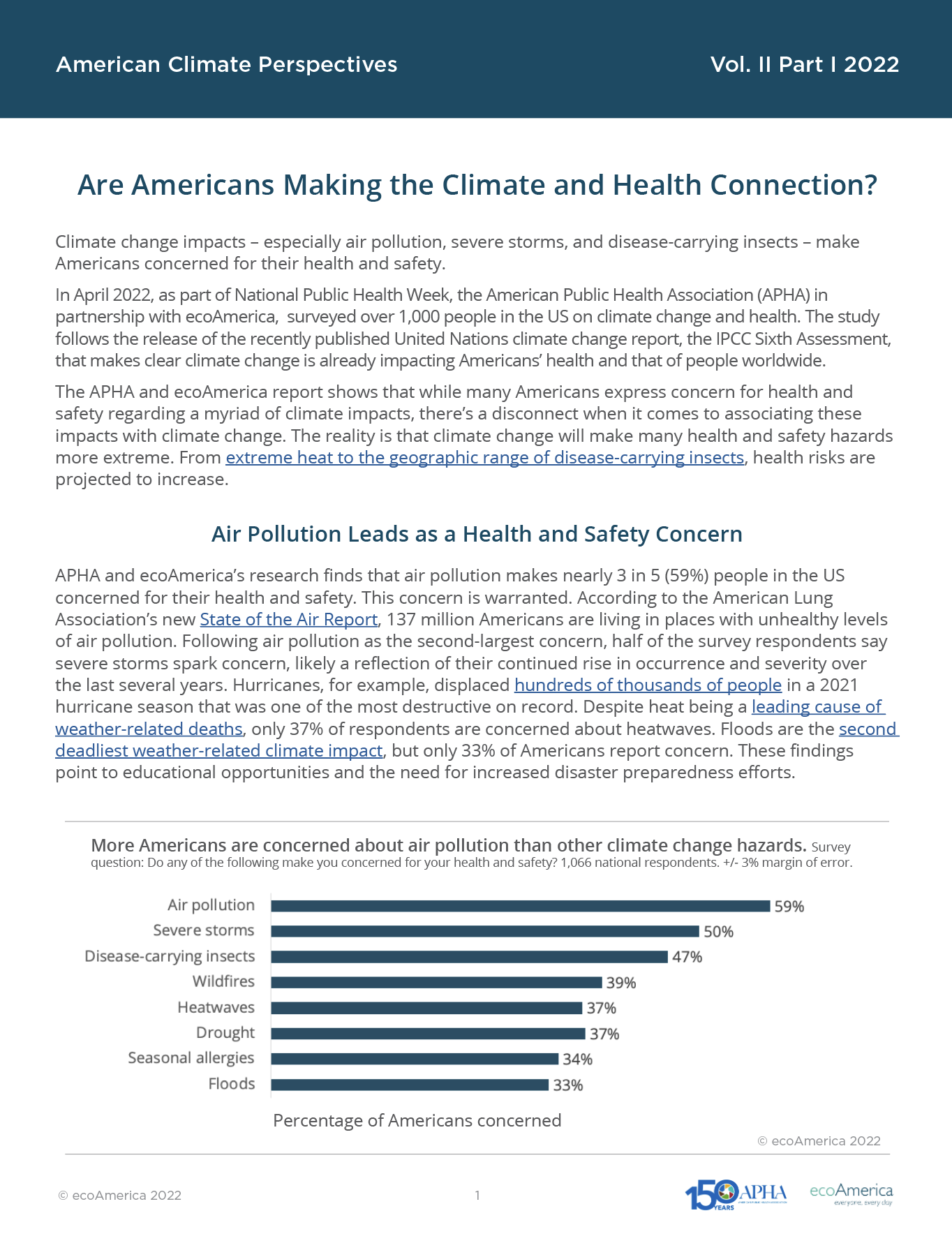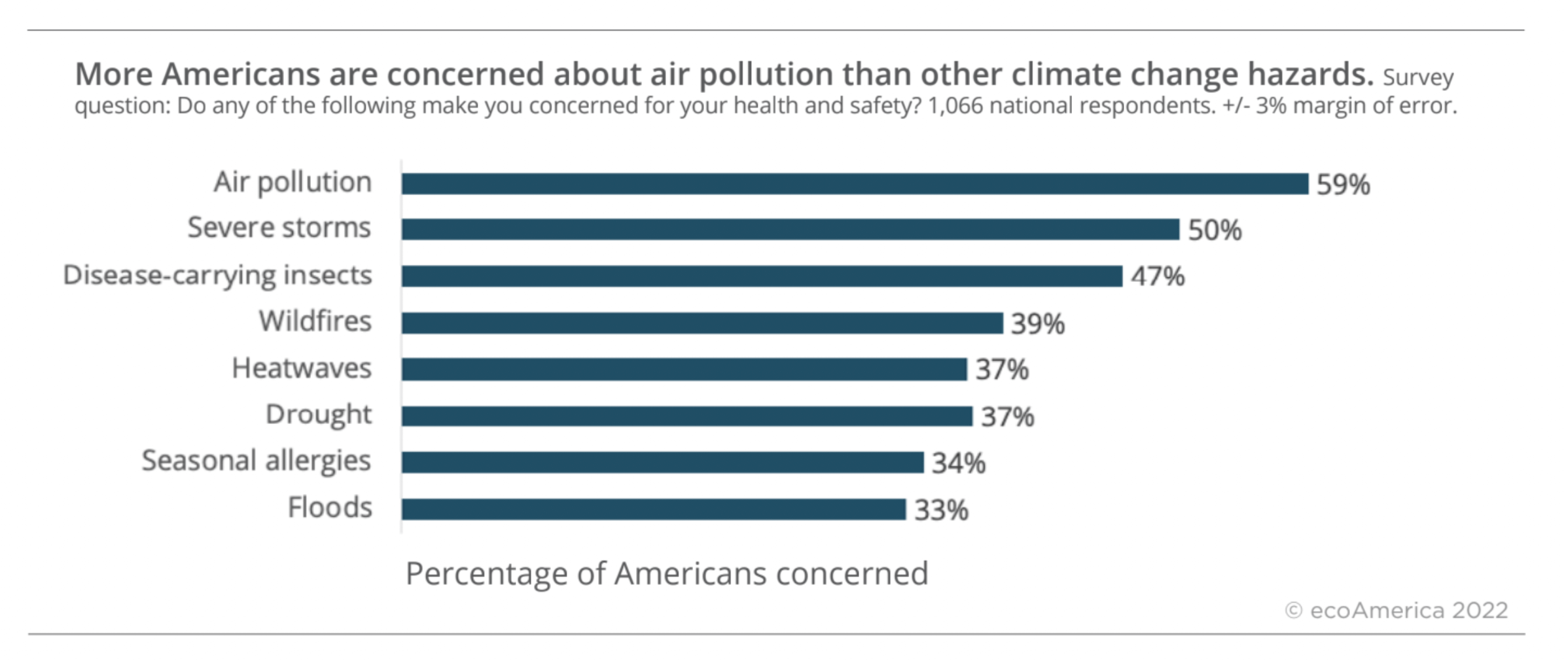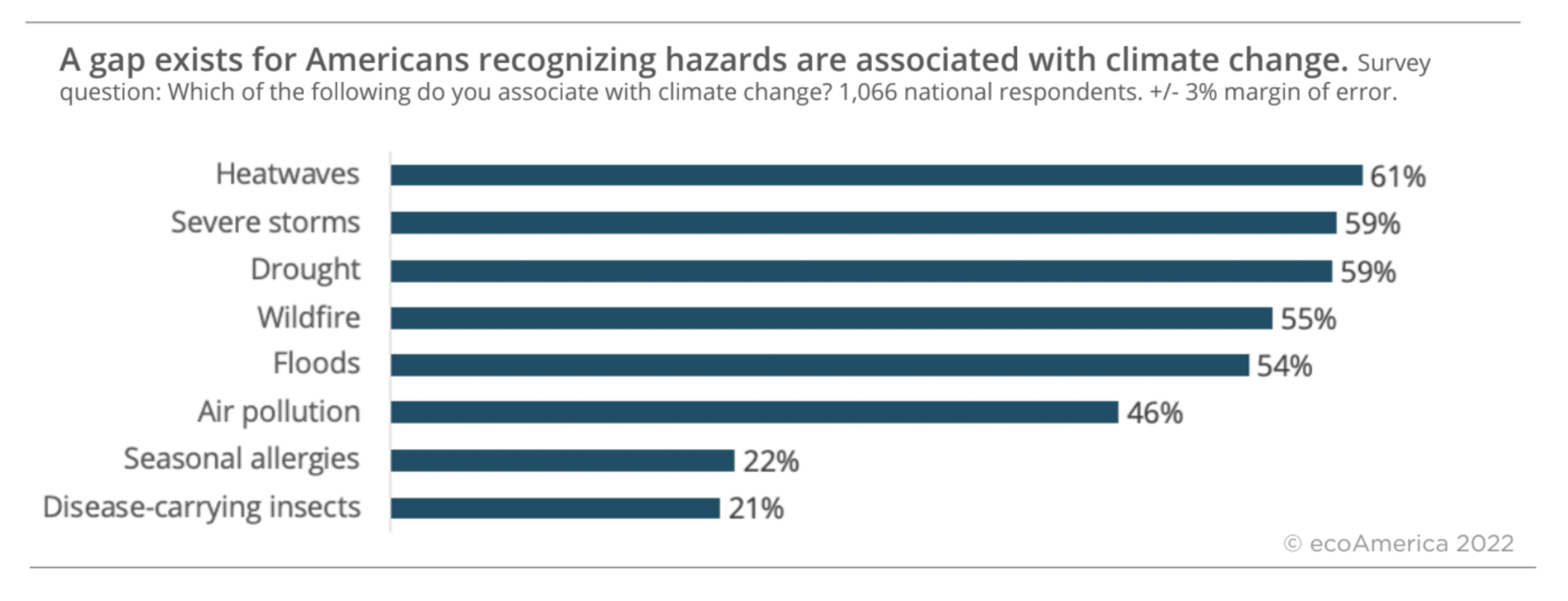American Climate Perspectives Survey 2022, Vol. II, Part I
Are Americans Making the Climate and Health Connection?

Climate change impacts – especially air pollution, severe storms, and disease-carrying insects – make Americans concerned for their health and safety.
In April 2022, as part of National Public Health Week, the American Public Health Association (APHA) in partnership with ecoAmerica, surveyed over 1,000 people in the US on climate change and health. The study follows the release of the recently published United Nations climate change report, the IPCC Sixth Assessment, that makes clear climate change is already impacting Americans’ health and that of people worldwide.
The APHA and ecoAmerica report shows that while many Americans express concern for health and safety regarding a myriad of climate impacts, there’s a disconnect when it comes to associating these impacts with climate change. The reality is that climate change will make many health and safety hazards more extreme. From extreme heat to the geographic range of disease-carrying insects, health risks are projected to increase.
Air Pollution Leads as a Health and Safety Concern
APHA and ecoAmerica’s research finds that air pollution makes nearly 3 in 5 (59%) people in the US concerned for their health and safety. This concern is warranted. According to the American Lung Association’s new State of the Air Report, 137 million Americans are living in places with unhealthy levels of air pollution. Following air pollution as the second-largest concern, half of the survey respondents say severe storms spark concern, likely a reflection of their continued rise in occurrence and severity over the last several years. Hurricanes, for example, displaced hundreds of thousands of people in a 2021 hurricane season that was one of the most destructive on record. Despite heat being a leading cause of weather-related deaths, only 37% of respondents are concerned about heatwaves. Floods are the second deadliest weather-related climate impact, but only 33% of Americans report concern. These findings point to educational opportunities and the need for increased disaster preparedness efforts.
 Americans Need Help Making the Climate Connection
Americans Need Help Making the Climate Connection
Over half of US survey respondents accurately associate heatwaves, severe storms, drought, wildfires, and floods with climate change. However, less than half associate air pollution — and less than a quarter associate seasonal allergies (22%), and the spread of disease-carrying insects (21%) — with climate change.
Despite nearly 60% of respondents voicing concern about air pollution, only 46% associate it with climate change. In reality, climate change and air pollution are closely intertwined. The burning of fossil fuels not only drives the changing climate while releasing air pollutants, but climate change also creates conditions that increase the risk of harmful ozone levels and particle pollution — which are exacerbated even further by drought and wildfires. People with pollen allergies may also be at higher risk of impact due to longer allergy seasons and air pollutants worsening allergic reactions.
As for heatwaves, over 3 in 5 (61%) Americans associate them with climate change — representing a 24-point gap compared to the expressed health and safety concerns.
Overall, APHA and ecoAmerica’s findings indicate an opportunity to help people in the US understand and communicate the health risks of climate change, including the acute impacts of disaster events (heatwaves, severe storms, wildfire, floods) and the health impacts of longer-term climate change (heatwaves, drought, allergies, insects).

Full data featured in this blog is available in the accompanying toplines.
Share these findings on Social Media! Click here for the social toolkit, including:

Methodology
ecoAmerica and the American Public Health Association designed and administered this survey, which was conducted online on April 15, 2022 using Survey Monkey. The survey yielded a total of 1,066 complete adult responses and used the Census Bureau’s American Community Survey to weigh the national general population and reflect the demographic composition of the US. Respondents were asked for information on their sex, race/ethnicity, age, state, and education level so Survey Monkey could weigh the results to be nationally representative. The sample was drawn from an online panel and the respondents were screened to ensure that they were over the age of 18. The margin of error for the sample is +/-3%. In interpreting the survey results, it is important to note that all sample surveys are subject to possible sampling error. Thus, the results of a survey may differ from the results that would be obtained if the entire population was interviewed. The size of the sampling error depends upon both the total number of respondents in the survey and the percentage distribution of the responses to a particular question. For example, if 50% of the respondents in a sample of 1,066 respondents answered, “Yes” to a particular question, we can be 95% confident that the true percentage would fall within 3 points, or range from 47% to 53%.
Suggested Citation
Speiser, M., Hill, A. N., Catalano, K. (May, 2022). American Climate Perspectives Survey 2022. Vol II. Part I. Are Americans Making the Climate and Health Connection?. ecoAmerica. Washington, DC.
© 2022 ecoAmerica. The contents of this report may be shared and used under a Creative Commons Attribution Non Commercial NoDerivatives 4.0 International License.
For more information contact us at research@ecoAmerica.org.
Subscribe to receive ecoAmerica’s research in your inbox.
[…] in greater community resiliency. ecoAmerica research has found that a majority of Americans are concerned about climate change and there is strong support for a range of climate action. There are actions we can take today as […]
[…] in greater community resiliency. ecoAmerica research has found that a majority of Americans are concerned about climate change and there is strong support for a range of climate action. There are actions we can take today as […]